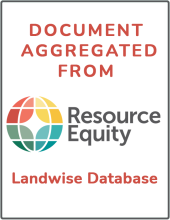Land Library
Welcome to the Land Portal Library. Explore our vast collection of open-access resources (over 74,000) including reports, journal articles, research papers, peer-reviewed publications, legal documents, videos and much more.
/ library resources
Showing items 1 through 9 of 95.The findings of this study demonstrate that the despite the bouquet of land laws and other land reforms that have been put in place to make it easier for women to access land rights, both the formal and informal systems remain fraught with multiple extra-legal obstacles in the form of personal (f
Abstract With an estimated 50% of global land held, used, or otherwise managed by communities, interfacing indigenous, customary, and informal land tenure systems with official land administration systems is critical to achieving universal land tenure security at a global scale.
While strengthening women’s land rights is increasingly on national and international agendas, there is little consensus on how to understand women’s tenure security.
Land as an essential resource is becoming increasingly scarce due to population growth. In the case of the Kenyan coast, population pressure causes land cover changes in the Arabuko Sokoke Forest, which is an important habitat for endangered species.
Pastoralism faces diverse challenges, that include, among others, land tenure insecurity, that has necessitated the need to formalize land rights.
Version française du rapport.
Qu’est-ce qui fonctionne en termes de droits fonciers des femmes? Ce que nous savons et ce qu’il nous reste à savoir
****
This case study reviews available literature on the land tenure situation of women in Sierra Leone and analyses the impact of an FAO project in two rural villages in ensuring that women are better able to claim their customary rights to land.
Hybrid land tenure administration occurs in a number of South Africa’s state-subsidised housing projects and in the informal settlements from which the housing beneficiaries tend to be drawn. Ownership is the tenure form in most of these housing projects.
Since around 2011 pilot projects to innovate land tenure documentation are being implemented in various countries in the global south in order to address the shortcomings of formal land registration.



